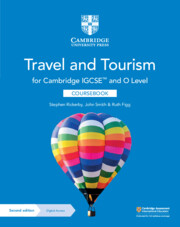From business travel to ecotourism, this second edition supports students to develop practical skills across a range of roles in one of the world’s largest industries. Help students develop their analytical skills to build a deeper understanding of modern tourism, through case studies exploring topics such as the impact of the COVID-19 pandemic. Suitable for the Cambridge IGCSE™ and O Level Travel & Tourism syllabuses (0471/7096), for examination from 2024. The coursebook supports students whose first language is not English, with key terms and concept links, as well as visual tools throughout, to aid understanding.
Features
- Activities and contemporary case studies, accompanied by analytical questions, help students refine the key skills needed for further study.
- ‘Travel and tourism in context’ feature enables students to explore topics in a real-world context, to support their understanding.
- Group work and project work, such as student-led presentations, encourage active learning and support the development of critical thinking skills.
- Key word definitions, concept links and tips provided throughout.
- Visual tools, such as graphs and maps, provide additional language support.
- ‘Reflection’ boxes and self-evaluation checklists encourage students to become independent learners and assess their progress.
- Exam-style questions help students prepare for assessment.
- Supports progression to the Cambridge International AS & A Level Travel and Tourism syllabus.
Table of Contents
- Contents
- How to use this series
- How to use this book
- Introduction
- Introduction to command words
- Unit 1. Key concepts of travel and tourism
- 1.1. Main types of tourism
- 1.2. Main reasons why people travel
- 1.3. Sustainability in travel and tourism
- 1.4. Characteristics of travel and tourism
- 1.5. Types of tourists
- 1.6. Types of destinations
- Exam-style questions
- Self-evaluation checklist
- Unit 2. Global tourism
- 2.1. The scale of travel and tourism demand
- 2.2. The features and appeal of destinations
- 2.3. Destination development and management organisations
- 2.4. Factors affecting tourism development and management
- 2.5. Managing destinations sustainably
- 2.6. Economic, environmental and sociocultural impacts of travel and tourism
- Exam-style questions
- Self-evaluation checklist
- Unit 3. Travel and tourism organisations
- 3.1. The role of tourism organisations, their sustainable practices, the products and services they provide and their appeal
- 3.2. Ways travel and tourism organisations work together
- 3.3. Different types of transport and their appeal
- 3.4. Sustainable developments in travel and transport
- 3.5. Domestic and international travel and transport infrastructure
- Exam-style questions
- Self-evaluation checklist
- Unit 4. Customer service in travel and tourism
- 4.1. The importance of customer service
- 4.2. Delivery of customer service
- 4.3. The provision of customer service for different types of tourists
- 4.4. Skills required when working in the travel and tourism industry
- Exam-style questions
- Self-evaluation checklist
- Unit 5. Destination marketing
- 5.1. The importance of marketing to travel and tourism organisations
- 5.2. Factors affecting marketing
- 5.3. The marketing mix
- 5.4. Market research and analysis
- 5.5. Market segmentation and targeting
- Exam-style questions
- Self-evaluation checklist
- Preparing for assessment
- Glossary
- Acknowledgements
- Index.
Advice on useful tools
Advice on useful tools, activities and timetabling from teachers experiencing school closures.
Cambridge GO
All our supporting resources have now moved to Cambridge GO – the new home for your Cambridge digital content.
Listen to our podcast
Listen to our podcast to discover teaching inspiration & advice from leading educational thinkers.




